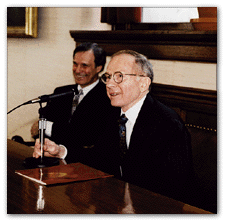Main Menu · Search · Current Issue · Contact · Archives · Centennial · Letters to the Editor · FAQs
![]()
Main Menu · Search · Current Issue · Contact · Archives · Centennial · Letters to the Editor · FAQs
![]()
| Commencement Day, 1996 | Medical Dean |
| Money Maven | Hail, Fellow! |
| New Pathway Extended | Seeger of Truth |
| Heard at Harvard | The Undergraduate |
| Crimson on the Tube | Sports |
| Phillips Brooks House | The University |

![]()
Daniel C. Tosteson '46, M.D. '49, announced on May 17 that he would resign as dean of Harvard Medical School at the end of the 1996-1997 academic year, after leading the medical faculty for 20 years.
In a statement to his Medical Schoolcolleagues, Tosteson cited dramatic changes in medicine. "Most importantly," he wrote, "the discoveries of science and the resultant inventions of new technologies year by year have increased the power of physicians to prevent, diagnose, and treat disease." Those developments, he noted, "have also raised to practical relevance many profound ethical issues which were heretofore largely of theoretical interest." He warned of more changes to come, in the delivery of medical care and, "particularly, the economics of the profession and the related industries," and added, "We have much to learn about how to bring the power and subtlety of the new cellular and molecular medicine to the cost-effective personal benefit of those whom we serve."
President Neil L. Rudenstine, in formally acknowledging Tosteson's decision, said that he had "served the Harvard Medical School, and the larger University community, with the greatest possible distinction and dedication�. Through his devotion to the medical profession-and through his humane concern for both the people within the profession and the people they serve-Dan Tosteson has personified the highest aspirations of the University: to advance the search for knowledge, and in so doing to help change lives for the better."
In an interview, Rudenstine said, "Everyone, even the other deans, would agree he's been the preeminent, outstanding dean." Assessing Tosteson's tenure since he returned to Harvard from the deanship of the University of Chicago's medical school in 1977, Rudenstine cited his role in "transforming medical education more thoroughly than any other medical school," through a case-based curriculum (see "The New Pathway," March-April 1996, page 71).
He also noted Tosteson's role in "bringing to the forefront the research programs in the Quadrangle," the core of the medical campus, now organized around new departments including genetics, cell biology, and biological chemistry and molecular pharmacology. Rudenstine called the caliber of the researchers Tosteson recruited "stunning." Federal research grants to faculty based in the Quadrangle have risen from $38 million to $85 million annually (including faculty at the Harvard-affiliated hospitals, such grants now exceed $400 million), and graduate students enrolled in the medical science departments' Ph.D. programs have more than tripled in number, to nearly 500. At the same time, the school created new "teacher clinician" and "clinician scholar" tracks for appointments and promotions, to encourage teaching by clinical faculty.
Finally, while refurbishing and expanding the research and teaching facilities-"They're in first-class shape," Rudenstine said-Tosteson has been able to keep the school "very healthy financially." The endowment, for example, has risen from $138 million to the current $840 million.
Looking ahead, Rudenstine said that wholesale changes underway in the Harvard-affiliated hospitals would shape the next dean's priorities. Already, several of the hospitals have joined forces and have begun to consolidate functions. "The new dean," he said, "will have to invest a substantial amount of time to assure that education and research programs are given the high priority they've traditionally been given, even if the resources are fewer" because of managed care, the move to outpatient treatment, and constrained federal support for medical financing and education.
Ever the educator, Tosteson himself set out something of an agenda for his colleagues and eventual successor. Their school, he wrote, is "blessed with an extraordinarily creative and industrious faculty and student body at all levels of development�new and renewed physical facilities�financial resources [that] are certainly constrained, but�sufficient to form the base from which to raise the financing for our programs." "If not us," he challenged them, "who will create the medicine of the twenty-first century?"
Main Menu · Search · Current Issue · Contact · Archives · Centennial · Letters to the Editor · FAQs
![]()
Harvard Magazine · 7 Ware Street · Cambridge, MA 02138 · Phone (617) 495-5746